2025-06-07 Sat
■ #5885. 7月19日(土)「深堀り『英語語源ハンドブック』徹底解読術 出版記念・鼎談」を朝日カルチャーセンター新宿教室にて開催 [asacul][hee][notice]

本ブログでもたびたび話題にしている『英語語源ハンドブック』(研究社)が,11日後の6月18日に発売される予定です.その発売からほぼ1ヶ月後の7月19日(土) 15:30--17:00 に,朝日カルチャーセンター新宿教室にて,共著者の唐澤一友氏,小塚良孝氏,堀田隆一の3名が集まり「深堀り『英語語源ハンドブック』徹底解読術 出版記念・鼎談」を開講します.今回の記事はその告知となります.
たいへんありがたいことに,すでに本書にご期待を寄せていただいている方々も多いと聞いています.本書が皆さんのお手元に届き,ページを繰っていただいているであろう頃合いに,この鼎談講座を開講することになります.講座の目的は,単なる近刊書紹介にとどまりません.副題に「徹底解読術」とあるように,発売後だからこそ語れる本書の魅力と,読者の皆さんに最大限に活用していただくための方法を,90分という時間に凝縮してお届けすることにあります.
鼎談では,まず本書全体の構成や効果的な読み方のポイントについて解説します.通読するもよし,辞書的に引くもよし,あるいは気の向くままに拾い読みするもよし.それぞれの楽しみ方があるかと思いますが,著者ならではの視点から,より深い「解読術」を伝授したいと思います.
そして,鼎談の醍醐味はここからです.唐澤氏,小塚氏,そして堀田が,それぞれの専門的見地から「イチオシの語源」を取り上げ,深掘り解説します.「え,あの単語とこの単語が繋がるの?」といった語源探求の驚きと興奮を,ライブで共有できれば幸いです.もちろん,執筆の裏話や,こぼれ話も満載となる予定です.3人の英語史研究者が集まれば,話しがどこまで転がっていくかは予想できませんので,私自身も大変楽しみです.
講座は,新宿の教室にお越しいただいての対面受講と,Zoom を利用したオンライン受講のどちらでも可能なハイブリッド形式です.遠方の方や当日のご都合が悪い方も,気軽にご参加いただけます.さらに,後日2週間限定の見逃し配信も用意されていますので,復習にもご活用いただけます.当日は質疑応答の時間も設けたいと思っております.皆さんが日頃抱いている語源に関する疑問を,著者陣に直接ぶつけるまたとない機会となるはずです.
また,当日は会場にて書籍販売とサイン会も予定されています.ぜひお手元の『英語語源ハンドブック』を片手に(あるいは会場でご入手いただき),英語史のロマンと語源探求のおもしろさを一緒に体感できればと思います.英語を学んでいる方,教えている方,そして純粋に言葉の歴史に興味のあるすべての方々のご参加を心よりお待ちしています.
改めて,講座の詳細は以下の通りです.
・ 講座名: 深堀り『英語語源ハンドブック』徹底解読術 出版記念・鼎談
・ 講師: 唐澤 一友(立教大学教授),小塚 良孝(愛知教育大学教授),堀田 隆一(慶應義塾大学教授)
・ 日時: 7月19日(土) 15:30--17:00
・ 形式: 教室での対面受講,または Zoom でのオンライン受講(2週間の見逃し配信あり)
・ 会場: 朝日カルチャーセンター新宿教室
・ 備考: 書籍販売,サイン会あり
お申し込みや詳細の確認は,こちらの公式サイトよりどうぞ.
7月19日,新宿の教室で,あるいは画面越しに,皆さんとお会いできることを楽しみにしています.
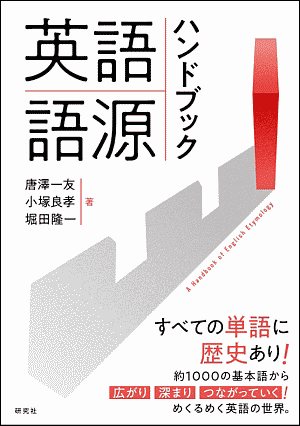
・ 唐澤 一友・小塚 良孝・堀田 隆一(著),福田 一貴・小河 舜(校閲協力) 『英語語源ハンドブック』 研究社,2025年.
2025-06-06 Fri
■ #5884. YouTube 「文藝春秋PLUS」にて英語史の魅力を語りました(後編) --- なぜ英語は世界のコトバになったのか? [notice][youtube][word_order][article][plural][prescriptive_grammar][sociolinguistics][helkatsu][hel_education][sobokunagimon]
昨日の記事に引き続き,5月30日(金)に YouTube 「文藝春秋PLUS 公式チャンネル」で公開された英語史トークの後編(26分ほど)をご紹介します.タイトルは「【ややこしい英語が世界的言語になるまで】文法が確立したのはたった250年前|an appleのanは「発音しやすくするため」ではない|なぜ複数形はsばかりなのか|言語の"伝播"=権力」です.以下,動画を観る時間がない方のために,文章としても掲載します.
後編では,さらに踏み込んで,文法の変化や,英語が今日の「世界語」としての地位を築くに至った背景など,より大きなテーマについてお話ししています.
まず,文法の変化についてです.現代英語の大きな特徴の一つに,語順が厳格に定まっている点が挙げられます.「主語+動詞+目的語」 (SVO) という型が基本であり,これを崩すと文の意味が通じなくなったり,非文法的になったりします.しかし,1000年前の古英語の時代に遡ると,語順はもっと自由でした.名詞の格変化が豊かだったため,語順を入れ替えても文の骨格が崩れにくかったのです.この点では,現代日本語と比較できるタイプだったのです.
現代英語のような固定語順の文法が確立したのは,歴史的にみれば比較的最近のことです.18世紀半ば,いわゆる規範文法の時代に,ロバート・ラウス (Robert Lowth) などの文法学者が「正しい」英語のルールを定め,それが教育を通じて社会に広まっていきました.それ以前は,互いに意味が通じればそれでよい,というような,より自然発生的で流動的な文法が主流だったのです.
次に,名詞の複数形の歴史も興味深いテーマです.現代英語では,名詞の複数形は99%近くが語尾に -s をつけることで作られます.これは非常に規則的で,学習者にとってはありがたい点かもしれません.しかし,これもまた歴史の産物です.古英語では,複数形の作り方は一様ではなく,現代ドイツ語のように,名詞の性や格変化の種類によって様々なパターンがありました.
その名残が,現代英語に不規則複数形として生き残っている単語群です.例えば,ox/oxen のように -n で複数形を作るタイプ,foot/feet や man/men のように語幹の母音を変化させるタイプ,そして child/children のように古英語の名詞複数語尾 -ru に由来する -r- を含むタイプなどです.これらの単語がなぜ現代まで不規則なまま残っているのかというと,きわめて基本的な日常語彙であり,使用頻度が高かったために,-s をつけるという新しい規則の波に飲み込まれずに抵抗し得たからです.
トークでは,不定冠詞 a/an の使い分けについても,学校文法で習う説明とは逆の歴史を明らかにしました.私たちは「次にくる単語が母音で始まるときには,発音の便宜上 an を使う」と学びます.しかし,歴史の真実はその逆です.もともと不定冠詞は,数字の one が弱まった an という形しかありませんでした.つまり,an apple こそがデフォルトの形だったのです.そして,an book のように次に子音が続く場合に,/n/ と /b/ という子音が連続して発音しにくいために,n のほうが脱落して a book という形が生まれたのです.まさに目から鱗が落ちるような事実ではありませんか.
そして最後に,最も大きな問い「なぜ英語は世界語になったのか?」についてお話ししました.この問いに対する答えは,言語そのものの性質 --- たとえば文法が単純だからとか,語彙が豊富だからとか --- とは,ほとんど無関係です.ある言語が国際的な地位を得るかどうかは,ひとえに,その言語を話す人々の社会がもつつ「力」,すなわち政治力,軍事力,経済力,技術力といったパワーに依存します.
英語の場合,18世紀以降のイギリス帝国の世界展開と,20世紀以降のアメリカ合衆国の圧倒的な国力が,その言語を世界中へ押し広げる原動力となりました.これは歴史上,漢文を国際語たらしめた古代中国の力や,ラテン語をヨーロッパの公用語としたローマ帝国の力と,まったく同じ原理です.言語の影響力は,常に社会的な力の勾配に沿って,上から下へと流れるのです.
このように,英語の歴史を学ぶことは,単なる暗記ではなく,現代英語の姿の背後にあるダイナミックな変化の過程と,その背景にある人々の社会や文化を理解する営みです.「言葉の乱れ」を嘆く声も,長い歴史のスケールで見れば,言語が生きている証としての自然な変化の1コマに過ぎないことが見えてきます.
トーク前編と合わせてご覧いただくことで,英語という言語の立体的な姿を感じていただけることと思います.
2025-06-05 Thu
■ #5883. YouTube 「文藝春秋PLUS」にて英語史の魅力を語りました(前編) --- なぜ英語の綴字はこんなに不規則なのか? [notice][youtube][spelling_pronunciation_gap][me_dialect][etymological_respelling][sound_change][through][thorn][digraph][norman_conquest][prestige][helkatsu][hel_education][sobokunagimon]
5月30日(金),YouTube 「文藝春秋PLUS 公式チャンネル」にて,前後編の2回にわたり,「英語に関する素朴な疑問」に答えながら英語史を導入するトークが公開されました.フリーアナウンサーの近藤さや香さんとともに,計60分ほどお話をしています.
前編は「【know の K はなぜ発音しない?「英語史」で英語のナゼがわかる】国内唯一慶應だけの必修科目|古代英語はもはや別言語|500通り以上の綴りがある英単語|"憧れ"と"威信"が英語を変化させた」と題して,35分ほどお話ししました.動画を観る時間がない方のために,以下に文章としてお届けします.
今回のトーク番組(前編)では,英語史の魅力や学びのおもしろさを,特に現代英語が抱える様々な疑問と絡めながら,導入的に解説しています.hellog の読者の皆さんにも,きっと楽しんでいただける内容かと思います.
そもそも英語史とは,単に英語という言語の歴史を追うだけではありません.その言語を話してきた人々の社会や文化の歴史,つまりは世界史と密接に結びついた,実に奥深い分野です.私は英語史は「英語」と「歴史」であると考えています.
なぜ英語史を学ぶのでしょうか.それは,現代英語を学習するなかで誰もが抱く素朴な疑問,たとえば,なぜ3単現に -s がつくのか,なぜ不規則動詞はこんなにも多いのか,そしてとりわけ「なぜ英語の綴字と発音はこれほどまでに食い違うのか」といった問いに対して,歴史的な視点から実に鮮やかな説明を与えてくれるからです.私自身,学生時代にこの「腑に落ちる」感覚に魅了され,英語史研究の道へと進むことになりました.今回の番組では,このおもしろさの一端でもお伝えできればと思っています.
さて,番組の中心的な話題となったのは,英語の綴字と発音の乖離の問題です.英語の歴史は約1600年間ほどあり,大まかに古英語(449--1100年頃),中英語(1100--1500年頃),近代英語(1500--1900年頃),現代英語(1500--現在)の4期に区分されます.中英語であれば,訓練を積んだ英語ネイティブならなんとか読解可能ですが,古英語に至っては,用いられている文字も異なり,もはや外国語にしか見えないでしょう.
この長い歴史のなかで,綴字と発音の間にずれが生じる原因は多数ありました.番組では,主な要因を3つほど紹介しました.1つ目は,方言の混交です.特に中英語期には,イングランド内で多様な方言が話されており「標準語」というべきものが存在しませんでした.後の時代に標準化が進んでいく過程で,ある単語の綴字はとある方言から採用され,発音は別の方言から採用される,というようなミスマッチが生じたのです.例えば busy /ˈbɪzi/ という単語の <u> の綴字はイングランド西部方言に由来し,/ɪ/ という発音は北部方言に由来します.build の <ui> という綴字も,同様の混乱が生んだ産物です.
2つ目は,ルネサンス期の学者たちによる「お洒落」な改変です.16世紀,古典語であるラテン語やギリシア語への憧れから,教養ある学者たちが,単語の語源を綴字に反映させようと試みました.その結果,本来発音されない文字が,語源に倣って意図的に挿入されることになったのです.典型的な例が doubt の <b> (ラテン語 dubitāre に由来)や receipt の <p> (ラテン語 recepta に由来)です.当時の読み書きは知識階級の独占物だったため,彼らの決めた綴字が「正しい」ものとして定着してしまいました.そのような綴字は,教育を通じて世代から世代へと受け継がれ,一種の制度として固定化されていきました.綴字改革運動が繰り広げられることしばしばもありましたが,ほぼすべてが成功せずに現在に至ります.
3つ目は,自然な音変化です.know や knife の語頭の <k> が発音されないのは,この例です.かつては /kn/ と発音されていたこの子音連鎖が,17世紀末から18世紀にかけて弱まり,やがて /k/ の音が脱落しました.しかし,その音変化が完了するより前に綴字が固定化してしまっていたため,発音されない <k> が綴字においては現代に至るまで残存しているというわけです.
番組では,中英語期にとりわけ豊かな綴字のヴァリエーションを示した単語として through を挙げました.私が調査したところでは,この単語には実に516種類もの綴字がありました.また,古英語や中英語で用いられていた文字 <þ> (thorn) が,なぜわざわざ <th> という2文字の組み合わせに置き換えられてしまったのか,という話題にも触れました.これには,1066年のノルマン征服以降に英語に流入したフランス単語が放っていた威信が関係します.フランス語にはない文字 <þ> は「野暮ったい」とされ,フランス語風の <th> を用いるのが「お洒落」と見なされるようになったのです.言語の変化とは,必ずしも合理性や利便性だけで駆動するのではなく,こうした「ファッション」というべき非合理的な要因にも大きく左右される,実に人間臭い営みなのです.
このように,英語の歴史を紐解くことで,現代英語の不可解な側面に光を当てることができます.英語史の知識は,英語学習者が抱えるフラストレーションを,知的な好奇心へと転化させる力を持っているといえるのです.
今回の番組は,英語史の導入として,あるいは英語という言語への関心を深めるきっかけとして,多くの方にご覧いただければ幸いです.
2025-06-04 Wed
■ #5882. 今週末(土),京都で『英語語源ハンドブック』の新刊紹介 --- 日本中世英語英文学会西支部例会にて [academic_conference][hee][notice][heldio][helwa][hel_education][elt][etymology]
今週末6月7日(土)の午後は,近刊書『英語語源ハンドブック』(研究社)をめぐり京都が熱い!
立命館大学の衣笠キャンパスにて,日本中世英語英文学会の第41回西支部例会が開催されます.本日より2週間後の6月18日(水)に発売予定の『英語語源ハンドブック』の共著者3名による新刊紹介セッションが開かれることになっているのです.開催要領は以下の通りです.
IV 新刊紹介 (15:10~15:50) 学而館 GJ 401 教室
『英語語源ハンドブック』(研究社,2025 年)
唐澤一友(立教大学教授)
小塚良孝(愛知教育大学教授)
堀田隆一(慶應義塾大学教授)
司会 福田一貴(駒澤大学教授)
共著者である唐澤一友氏,小塚良孝氏,そして堀田隆一の3名が対面で集合し,公の場で本書について語るのは,本書出版の情報公開後,初めての機会となります.本書の狙いや魅力についてお話しする予定です.なお,司会の福田一貴氏には,小河舜氏(上智大学)とともに,本書の校閲に協力いただいています.
本書の位置づけは,単に英単語の語源を解説する語源辞典の簡略版ハンドブックというわけではありません.むしろ,英語史の知識をいかに英語の教育・学習に活かすか,その具体的な方法を提案することに主眼を置いています.英語教員が授業で披露すれば学生の知的好奇心をくすぐるであろう豆知識や,英語学習者が単語の奥深さに触れることで記憶に定着させやすくなるようなエピソードが豊富に盛り込まれています.語源のみならず,意味・発音・用法の歴史的変遷にも光を当て,巻頭の英語史概説や巻末の用語解説と合わせて読めば,自然と英語史の基礎知識も身につくように編まれています.
本書は日本語で書かれていますが,英語タイトルとして Handbook of English Etymology (= HEE) も設定されています.発売前ではありますが,hellog でもすでに hee のタグを付けて,いくつかの記事を公開してきましたので,そちらもお読みください.
ちなみに,今回の西支部例会には,新刊紹介の直後に目玉企画が用意されています.こちらも合わせてご案内します.
V 企画発表 (16:05~17:50) 学而館 GJ 401 教室
〈仄暗き中世〉の系譜と魅力 --- 中世暗黒化言説を巡って
司会・総論 岡本広毅(立命館大学准教授)
清川祥恵(佛教大学講師)
小澤実(立教大学教授)
大西巷一(漫画家)
こちらの西支部例会にご関心のある方は,公式HPをご訪問ください.
また,『英語語源ハンドブック』の共著者らが京都入りする金曜日以降,Voicy heldio 収録や生配信などもあり得ますので,ぜひ私の heldio および X アカウントをフォローして,続報をお待ちください.

・ 唐澤 一友・小塚 良孝・堀田 隆一(著),福田 一貴・小河 舜(校閲協力) 『英語語源ハンドブック』 研究社,2025年.
2025-05-31 Sat
■ #5878. YouTube チャンネル「文藝春秋PLUS」にて英語史入門トークが配信されました [youtube][hel_education][helkatsu][notice][sobokunagimon]
昨日5月30日(金),YouTube 「文藝春秋PLUS 公式チャンネル」にて,前後編の2回にわたり,「英語に関する素朴な疑問」に答えながら英語史を導入するトークが公開されました.フリーアナウンサーの近藤さや香さんとともに,計60分ほどお話をしています.
前編は「【know の K はなぜ発音しない?「英語史」で英語のナゼがわかる】国内唯一慶應だけの必修科目|古代英語はもはや別言語|500通り以上の綴りがある英単語|"憧れ"と"威信"が英語を変化させた」と題して,35分ほどお話ししています.こちらの告知記事,および下記の分秒リストと合わせて,ご視聴いただければ.
00:00 オープニング
01:27 英語史とは何か
03:48 国内唯一 慶應だけの必修授業
04:27 英語史研究者になった理由
07:24 古英語,中英語とは
10:56 なぜ綴りと発音が違うのか
15:25 読まない b や p がある理由
19:25 なぜ綴りと発音を統一しないのか
22:53 読まない k や gh がある理由
28:15 through には500以上の綴りがあった
33:00 英語を変化させた憧れと威信
後編は26分ほどの「【ややこしい英語が世界的言語になるまで】文法が確立したのはたった250年前|an appleのanは「発音しやすくするため」ではない|なぜ複数形はsばかりなのか|言語の"伝播"=権力」です.こちら告知記事もどうぞ.
00:00 オープニング
01:18 child の複数形はなぜ children なのか
05:43 なぜ a apple ではなく an apple なのか
09:20 文法が決まるまでの過程
15:04 なぜ英語が世界的な言語になったのか
19:53 英語史を学んで見えてくるもの
今回の動画を通じて,1人でも多くの方に英語史のおもしろさや意義が伝わればと思います.
2025-05-30 Fri
■ #5877. 発音とアクセントはどう移ろうか --- 水野太貴さんによる『中央公論』の連載より [yurugengogakuradio][notice][language_change][dialect][dialectology][stress][pronunciation][sound_change][japanese][phonetics][heldio]

今年度,興奮をもって追いかけている連載があります.言語学系 YouTube/Podcast チャンネル「ゆる言語学ラジオ」の水野太貴さんが,『中央公論』にて「ことばの変化をつかまえる」と題して執筆されているシリーズです.言語変化 (language_change) という,ともすれば専門的で敬遠されがちなテーマに光を当て,第一線の研究者へのインタビューを通じてその核心に迫ろうという,野心的な企画です.今年度は毎月本誌の発売を心待ちにするという習慣がついてしまいました.
連載第3回となる最新6月号では「発音とアクセントはどう移ろうか --- 歴史言語学者・平子達也さんに聞く」と題して,言語変化のなかでも特に根源的といえる音変化 (sound_change) が扱われています.私自身,英語史研究のなかで音韻や形態の変化を主たるフィールドとしてきただけに,今回のテーマにはとりわけ深い関心を抱きました.そして期待に違わず,今回の記事は心に深く刺さるものがありました.
音変化は言語変化における最大のミステリーである,と私は考えています.語彙や文法の変化も謎に満ちていておもしろいのですが,言語活動の基盤となる「音」が,なぜ,どのようにして変わるのかという問いは,最も捉えがたく,そして魅力的な謎なのです.専門家ですら説明に窮することの多いこの難題に,水野さんは南山大学の平子達也先生へのインタビューを通じてグイグイ迫っていきます.専門性の高いトピックをこれほど分かりやすく導入している文章を,私はあまり読んだことがありません.
記事は「なぜ発音は変わるのか」という素朴な疑問から始まります.平子先生は,その主要な動機の1つを「調音器官のスムーズな運動」への欲求,すなわち発音を楽にしたいという話者の都合に求めます.これは言語学で「最小努力の原則」 (The Principle of Least Effort) といわれているものです.私たちは無意識のうちに,発音を楽な方へと変化させている,というわけです.
しかし,もしこの原則だけが支配的ならば,すべての発音はどんどん簡略化され,例えば母音はすべて曖昧母音に収斂してしまうでしょう.すると,コミュニケーションの道具として機能不全に陥ってしまうはずです.しかし,現実はそうなっていなません.そこに「歯止め」となる力が働いているからです.
この点について,平子先生は次のように指摘されています (p. 171) .「言語というのは音だけで成るわけではありません.単語や文法など,ほかの体系と密接にかかわっていますから,それらとの兼ね合いで,一方向には進まないという事情があります.」
確かに音は語彙や文法といった言語体系の他の構成要素と固く結びついています.そして,平子先生は音変化の本質を次のように喝破します (p. 172) .「つまり発音の変化は,調音上の都合でラクしたいという動機と,その他の構成要素の制約のあいだで緊張関係を保ちながら起こるわけです.」
「緊張関係」という一言に,音変化のダイナミズムが凝縮されていますね.一方に引っ張る力と,それに抗うもう一方の力.その拮抗のなかで,言語は常に揺れ動き,姿を変えていきます.この記事は,その複雑なプロセスの存在を専門家でない読者にも実感させてくれます.ぜひ皆さんにこの記事を直接読んでいただければと思います.
今回ご紹介した記事は heldio でも「#1459. 音変化のミステリー --- ゆる言語学ラジオの水野太貴さんの『中央公論』連載「ことばの変化をつかまえる」より」として紹介しています.お聴きいただければ.
・ 水野 太貴 「連載 ことばの変化をつかまえる:発音とアクセントはどう移ろうか --- 歴史言語学者・平子達也さんに聞く」『中央公論』(中央公論新社)2025年6月号.2025年.168--75頁.
2025-05-28 Wed
■ #5875. ウェブ月刊誌 Helvillian の6月号が公開されました [helwa][heldio][notice][helmate][helkatsu][helvillian][link][khelf][terasawashiho]
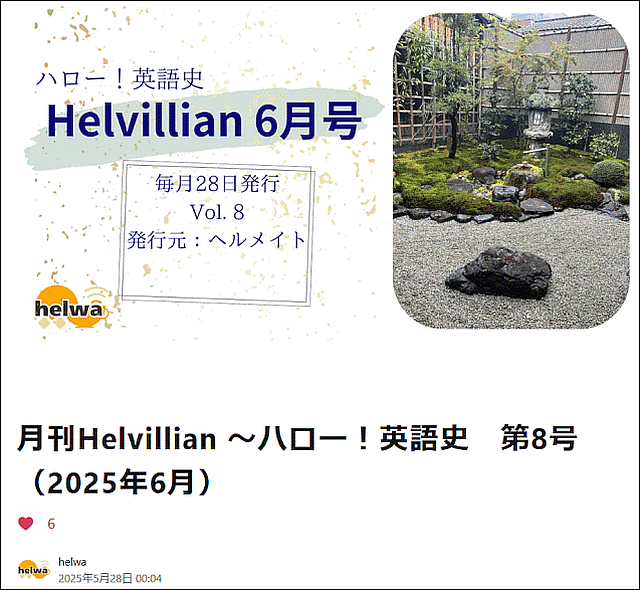
本日,有志ヘルメイトによる『月刊 Helvillian 〜ハロー!英語史』の2025年6月号(第8号)がウェブ公開されました.hel活 (helkatsu) の熱気が,すさまじく高まっているのを感じます.質量ともに,遊びどころではなく本格的なウェブマガジンに成長してきました.
初夏号の表紙デザインは Grace さん,そして「表紙のことば」は Lilimi さんが担当.京都オフ会の静謐な庭園を切り取った一枚から,むしろヘルメイトによるhel活の熱さが伝わります.
巻頭特集は,khelf(慶應英語史フォーラム)の寺澤志帆さんへのロング・インタビューの前・後編.続けて,寺澤さん本人による helwa オフ会潜入ルポ「helwa はまさに「英語史の輪」だった!」が掲載されます.大学院での研究生活のリアルから helwa コミュニティとの化学反応まで,読み応えたっぷりです.
そして,今号の2大特集が展開します.1つめの特集は,「京都オフ会」に参加された方々の寄稿記事群です.京都駅にほど近いお寺さんを会場にした4月13日のオフ会について,参加者それぞれの視点で紹介.堀田による振り返りから始まり,camin さん,ykagata さん,Lilimi さん,Galois/Misato さん,り〜みんさんによる多彩な筆致が並びます.オフ会前日の英語史研究会の裏話から,充実の収録会,美食ランチタイム,矢冨弘先生(熊本学園大学)の突然の参加,偽友達クイズ,夜の鍋パーティまで,オフ会の魅力が伝わってきます.
2つめの特集は「faux amis」(偽友達)についてです.英仏語の「紛らわしい語」をめぐり,金田拓さんと mozhi gengo さんに寄稿していただきました.camin さんによる新連載「英仏単語《FAUX-AMIS》クイズ」もスタート!
特集とは別に,レギュラー連載もますます充実してきています.川上さんの「英語のなぜ5分版」やってます通信はPDF版とnote版の2本立て.lacolaco さんの「英語語源辞典通読ノート」も順調に進んでいます.ari さんの『英語語源辞典』を使い倒すための「ゴラクエ」なるウェブアプリには驚かされました.Grace さんは「「きらびやかな書物の世界」展」の訪問記で写本の魅力をレポート.金田拓さんは目下 Bacon による Essays の精読に夢中です.
続けて,こじこじ先生は YouTube で生成AIを用いた英語史系動画3本を公開.みーさんは上記の「ゴラクエ」の体験記でゲーム実況さながらの熱量を披露.mozhi gengo さんは「ドナーと旦那は同語源か?」など語源コラムを連発しています.umisio さんは「国際交流にTさんも飛び入り参加!」など,上五島からのフィールド報告を続投.
雑誌の巻末にかけても,筆を執る手が緩まりません.Lilimi さんによる「helwa のあゆみ/活動報告(2025年6月)」では,新宿オフ会や皐月収録回@三田などのhel活最新動向をダイジェスト.「Helvillian 編集後記(2025年6月)」では,編集委員の Galois,umisio,Grace,Lilimi 各氏が座談会形式で舞台裏を語ります.
それにしても充実の最新号となっています.編集委員の方々,寄稿された皆さん,hel活へのご理解とご協力に感謝いたします.ありがとうございました.
Voicy プレミアムリスナー限定配信チャンネル「英語史の輪」 (helwa)や Discord 上の英語史コミュニティもますます活況を呈しています.近刊書『英語語源ハンドブック』の発売に向けた企画も水面下で進行中とのことです.
hellog 読者の皆さん,最新号の Helvillian をぜひ広めていただければと思います.そして,皆さんもhel活の輪に加わってみませんか? まずは helwa にお入りください!
2025-05-27 Tue
■ #5874. khelf 顧問の泉類尚貴さん(関東学院大学),note を始める [notice][khelf][heldio][voicy][helkatsu][elf][historical_pragmatics][hel_herald]
khelf(慶應英語史フォーラム)には,hel活 (helkatsu) こと英語史普及活動にいそしんでいるメンバーが多くいます.関連する最新ニュースとしては khelf 顧問の泉類尚貴さん(関東学院大学)が note を始められました.こちらからどうぞ.

泉類さんの「自己紹介」の記事を読むと,研究上の関心やhel活への思いがよく伝わってきます.社会言語学的な視点から英語史を捉えるアプローチや,ELF (English as a Lingua Franca; elf) に関する考察は,現代の英語のあり方を考える上で重要なトピックです.「呼びかけ語」という歴史語用論的なテーマも,英語史研究の潮流を意識したタイムリーな話題です.
泉類さんには,これまで Voicy heldio にも度々出演していただきました.上記 note の昨日公開の最新記事「「英語の語源が身につくラジオ(heldio)」出演まとめ」には,出演回の一覧がリンクとともに記されていますので,ぜひこの機会に過去回をお聴きください.最近の出演回は先日の土曜日,5月24日の「#1455. khelf 泉類さんとリンガ・フランカとしての英語をめぐって --- 皐月収録回@三田より」です.
泉類さんは,ほかにも khelf 発行の『英語史新聞』への寄稿など,khelf のhel活におおいに貢献してきてくれました.新たに開始された note でのhel活についても,今後の記事の更新がとても楽しみです.hellog 読者の皆さんもぜひ泉類さんの note をフォローしていただければ.hel活界隈,皆でますます盛り上げていきましょう!
2025-05-26 Mon
■ #5873. 共著者ら5名が語る『英語語源ハンドブック』(研究社)の魅力 [notice][hee][kenkyusha][heldio][helwa]
先週の5月20日(火)の夜,Voicy heldio にて近刊書『英語語源ハンドブック』をめぐり,共著者ら5名が全員集合して緊急生配信をお届けしました.その収録のアーカイヴ版が22日(木)に公開されています.「#1453. 緊急生配信企画(のアーカイヴ) 共著者と語る『英語語源ハンドブック』予約爆撃アワー」です(45分ほどの音声配信).ぜひお時間のあるときにお聴きください.
この緊急生配信と「予約爆撃アワー企画」を応援していただいた皆様の行動力が実を結び,その後 Amazon 新着ランキングで「英語」部門にて第1位,「語学・辞事典・年鑑」部門にて第2位を獲得することができました.ありがとうございました.
本書の発売予定日は22日後となる6月18日(水)です.それまでになるべく本書の認知度を広め,その価値が最大限に伝わるよう,努めていきたいと思います.引き続き応援のほど,よろしくお願いいたします.
なお,研究社の編集者さんに,上記生配信からの「発言まとめ」を作成していただきましたので以下に掲げます.
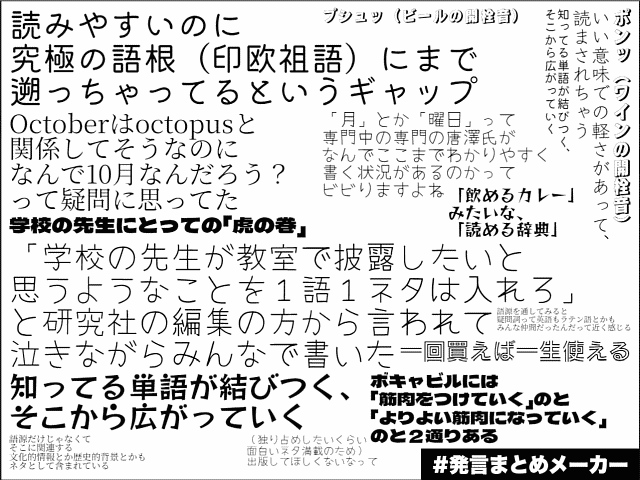
来たる2025年6月18日(水),唐澤 一友・小塚 良孝・堀田 隆一(著),福田 一貴・小河 舜(校閲協力)『英語語源ハンドブック』(研究社)が発売される予定です.5月21日以来の歴代記録として,Amazon 新着ランキングで「英語」部門にて第1位,「語学・辞事典・年鑑」部門にて第2位を獲得しています.こちらの Amazon ページ(あるいは以下のQRコード)より,ぜひ予約注文をお願いいたします.

・ 唐澤 一友・小塚 良孝・堀田 隆一(著),福田 一貴・小河 舜(校閲協力) 『英語語源ハンドブック』 研究社,2025年.
[ 固定リンク | 印刷用ページ ]
2025-05-25 Sun
■ #5872. 『英語語源ハンドブック』を初告知した heldio 緊急生配信の要旨 [voicy][heldio][notice][hee][kdee]
5月15日(水)の正午,研究社公式HPにて近刊『英語語源ハンドブック』の案内が掲載されました.これを受けて,同日18:20より Voicy heldio にて本書の共著者の1人として興奮の生配信をお届けしました.ライヴでお聴きいただいたリスナーの皆さんには感謝致します.その生配信は,翌日5月16日(木)の朝の heldio で「#1447. 緊急生配信(のアーカイヴ) --- 6月18日に『英語語源ハンドブック』(研究社)が出ます」として配信しました.30分ほどの熱いトークとなっています.以下は,その要旨となります.
本日(5月15日)正午,「緊急生配信」を行いました.聴いていただけましたでしょうか? なぜ「緊急」だったかというと,私たちの長年の夢がついに形になったからです! その興奮をいち早くお伝えすべく,急遽マイクの前に座った次第です.
新しい本が出ます.本日正午ついにその情報公開が解禁されました.その名も『英語語源ハンドブック』(唐澤 一友・小塚 良孝・堀田 隆一(著),福田 一貴・小河 舜(校閲協力))です.英語のタイトルは Handbook of English Etymology,略して HEE と呼んでいこうと思っています.この本が,約1ヶ月後の6月18日 (水)に研究社より発売されることになりました.
この本は,英語史を専門とする5名の研究者が総力を結集して作り上げた,前代未聞の1冊です.JACETの基本語1000語を取り上げ,その意味・語形・発音の変化や,単語間に隠されたつながりを,英語史の視点から徹底的に解説しています.研究社の紹介文にもあるように「見慣れた単語から,英語が四次元的に見えてくる」はずです.
どのような方々に読んでいただきたいかといえば,答えは様々ですが,以下の5点を挙げておきましょう.
1. 英語の語源を純粋に楽しみたい方
2. 英語の授業で使える「ネタ」を探している先生方(これが企画の最初のコンセプトでした)
3. 本格的に語源でボキャビルしたい方
4. 英語の「なぜ?」の背景を知りたい方
5. そして何より英語史の基礎を学びたい方
巷には語源に関する本はたくさんありますが,本書の最大の特徴は,英語史研究者が専門的な知見に基づき,信頼できる情報をできる限りやさしく解説している点にあります.
同じ研究社からは,本格的な『英語語源辞典』 (kdee) も出版されていますが,今回のハンドブックは,その専門的な世界への親切な「つなぎ役」になってくれると信じています.ハンドブックで語源の考え方や英語史の基礎に触れれば,より詳しい『英語語源辞典』の世界も楽しんで味わうことができるようになるでしょう.
発売までの約1ヶ月間,この hellog はもちろん,heldio その他の媒体でも共著者の方々との対談なども交えながら,この本の魅力を次々に発信していく予定です.ぜひ,SNS などでハッシュタグ #英語語源ハンドブック を活用して一緒に盛り上げていただけると幸いです.
最後に,なぜ私がこれほど興奮しているかというと,この本こそが「英語史をお茶の間に」広めるための,最大のチャンスだと信じているからです.この1冊を通じて,英単語の魅力はもちろん,英語という言語のもつ壮大な歴史とロマンを感じていただきければ.
皆さん,ぜひこちらより予約注文をお願いいたします! ご自宅に1冊,職場や学校の図書館にももう1冊.この本が,日本の英語学習・英語教育に新しい風を吹き込むことを確信しています.
来たる2025年6月18日(水),唐澤 一友・小塚 良孝・堀田 隆一(著),福田 一貴・小河 舜(校閲協力)『英語語源ハンドブック』(研究社)が発売される予定です.5月21日以来の歴代記録として,Amazon 新着ランキングで「英語」部門にて第1位,「語学・辞事典・年鑑」部門にて第2位を獲得しています.こちらの Amazon ページ(あるいは以下のQRコード)より,ぜひ予約注文をお願いいたします.

・ 唐澤 一友・小塚 良孝・堀田 隆一(著),福田 一貴・小河 舜(校閲協力) 『英語語源ハンドブック』 研究社,2025年.
[ 固定リンク | 印刷用ページ ]
2025-05-24 Sat
■ #5871. 「英語に関する素朴な疑問 プチ千本ノック生配信 with 小河舜さん」のアーカイヴを YouTube で配信しました [senbonknock][sobokunagimon][voicy][heldio][youtube][hel_education][notice][ogawashun][terasawashiho][khelf][helkatsu]
去る5月10日(土)の午前10時30分過ぎより,Voicy 「英語の語源が身につくラジオ (heldio)」にて「英語に関する素朴な疑問 プチ千本ノック生配信 with 小河舜さん」をライヴでお届けしました.いつもの千本ノック (senbonknock) は1時間ほどの長尺でお届けすることが多いのですが,今回はサクッと22分ほどのプチ回となりました.生配信でお聴きいただいたリスナーの皆さん,ありがとうございました.
前回の「#5851. 「英語に関する素朴な疑問 千本ノック --- GW回 with 小河舜さん」のアーカイヴを YouTube で配信しました」 ([2025-05-04-1]) のときと同様に,今回も小河舜さん(上智大学)とともにノックを受けました.小河さんは,最近hel活のために X アカウント @scunogawa を開設され,活発に情報発信されていますので,ぜひフォローしていただければ.
また,khelf(慶應英語史フォーラム)の寺澤志帆さんには,問題を選んで読み上げる係を務めてもらいました.寺澤さんも最近「『英語語源辞典』でたどる英語綴字史」シリーズという熱いhel活を始められているので,ぜひご訪問ください.
生配信の様子は音声のみならず動画としても収録していたので,このたび YouTube 「heltube --- 英語史チャンネル」より公開しました.上記スクリーン,あるいは「英語に関する素朴な疑問 プチ千本ノック生配信 with 小河舜さん」よりご覧ください.音声のみで聴きたいという方のために,後日 Voicy heldio でも配信すべく準備中ですので少々お待ちください.
今回取り上げた疑問は,いつものように慶應義塾大学文学部英米文学専攻の学生から寄せられたものです.今回はプチ回で,取り上げられたのは6問のみですが,おもしろいトークにはなっています.おおよその分秒とともに疑問を一覧します.
(1) 01:21 --- 「これ」は this,「あれ」は that なのに,「それ」は it になるのはなぜですか?
(2) 04:55 --- なぜ固有名詞(Tokyo や Japan など)の頭文字は大文字にしなければならないのですか?
(3) 08:57 --- なぜ -teen をもつ thirteen や fourteen とは異なり,eleven や twelve はこのような特別な形になるのですか? なぜ *twoteen や * threeteen ではないのですか?
(4) 12:52 --- 英語の方がおしゃれに感じるのは気のせいですか? 外国人もそう感じているのですか?
(5) 16:03 --- なぜ主節と従属節で時制を一致させる必要があるのですか?
(6) 19:15 --- なぜ相手の疑問文が肯定でも否定でも,答えが肯定なら Yes,否定なら No になるのですか?
今後も千本ノックのシリーズは続けていきます.過去の千本ノック企画については,本ブログの senbonknock 記事群よりアクセスしてください.
(以下,後記:2025/05/31(Sat))
今回の千本ノック生配信は heldio でも「#1462. 英語に関する素朴な疑問 プチ千本ノック with 小河舜さん --- 皐月収録回@三田より」として配信しています.
2025-05-23 Fri
■ #5870. 『英語語源ハンドブック』の最速レビュー第1号は mozhi gengo さんの note 記事 [notice][review][hee][helwa][helmate][kdee]
昨日の記事「#5869. ari さんによる『英語語源ハンドブック』の「試し読み」の熱烈レビューに感謝」 ([2025-05-22-1]) で,heldio/helwa のコアリスナー ari さんより,発売前の書籍のレビューをいただいた旨を報告しました.
なんと ari さんよりもさらに1日早く,5月16日のうちに最速レビューを投げていただいたコアリスナーがいらっしゃいました.mozhi gengo さんです.研究社からの公式な情報公開が5月15日の正午でしたので,とんでもないスピードで反応いただいたことになります.mozhi gengo さんに感謝! 「#210. 待望の書籍現る!英語語源ハンドブック」をお読みください.

mozhi gengo さんは,強い言語愛をお持ちで,とりわけヒンディー語を始めとするインド事情に詳しく,日々熱心に note 記事を公開されています.今回は,ご自身も愛用されている『英語語源辞典』(研究社)に触れつつ,近刊書『英語語源ハンドブック』(同じく研究社)とともに「親子本だと言ってよい」と表現されています.これはまさに的を射た評価です.この関係を念頭に,「子」に相当する『英語語源ハンドブック』がどのような役割を果たすのかについて,mozhi gengo さんは次のように記しています.
少し読んでみると,専門家が英語語源辞典を開いて,丁寧にその語にまつわるストーリーを分かりやすくコンパクトに話してくれているような印象を受ける.
これは,共著者が本書を通じて読者の皆様にお届けしたかった体験そのものです.専門的な知見を背景としつつも,それをいかに分かりやすく,そして魅力的なストーリーとして語るか.この意図を汲み取っていただけたことを,大変嬉しく思います.「まさに語源好きにとっての決定版!」そして「これはもう手に取るのが待ちきれない」とまで評価してくださったことは,何よりの励みとなります.
記事の最後では「著者の先生たちの対談も近日あるようなので,ぜひ heldio をチェックしよう」と,Voicy 「英語の語源が身につくラジオ (heldio)」での本書の取り上げにも期待を寄せてくださっています.さすが heldio/helwa のコアリスナーさん! ご期待に沿えるよう,様々な企画を検討していきたいと思います.
『英語語源辞典』は,英語の歴史や英単語の語源を深く探求する上での頼もしい相棒であり続けることは間違いありません.その一方で,『英語語源ハンドブック』は,いわば経験豊富な案内人が基本英単語の魅力を語り聞かせてくれるような存在になれればと考えています.「親子本両方とも手に取っていただければ幸いです.
来たる2025年6月18日(水),唐澤 一友・小塚 良孝・堀田 隆一(著),福田 一貴・小河 舜(校閲協力)『英語語源ハンドブック』(研究社)が発売される予定です.5月21日以来の歴代記録として,Amazon 新着ランキングで「英語」部門にて第1位,「語学・辞事典・年鑑」部門にて第2位を獲得しています.こちらの Amazon ページ(あるいは以下のQRコード)より,ぜひ予約注文をお願いいたします.

・ 唐澤 一友・小塚 良孝・堀田 隆一(著),福田 一貴・小河 舜(校閲協力) 『英語語源ハンドブック』 研究社,2025年.
[ 固定リンク | 印刷用ページ ]
2025-05-22 Thu
■ #5869. ari さんによる『英語語源ハンドブック』の「試し読み」の熱烈レビューに感謝 [notice][review][hee][helwa][helmate]
数日前より本ブログでも頻繁に触れている近著『英語語源ハンドブック』(研究社,6月18日発売予定)について,heldio/helwa のリスナーとしてもお馴染みの ari さんが,「試し読み」で公開されている部分を参照して,熱烈なユーモアあふれるレビュー記事をご自身の note にて公開くださっています.5月17日公開の「#285【英語史クイズ】英語語源ハンドブックを読・・・めない!!」です.
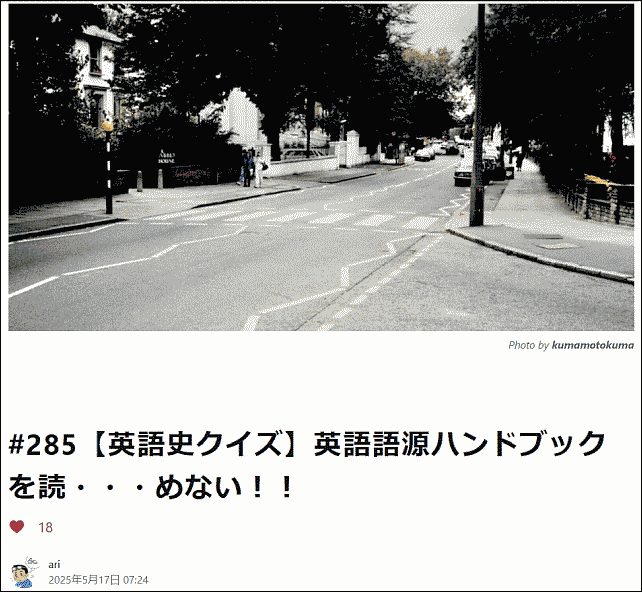 ,
,
「土曜日といえば,英語史クイズ!!でも今日は特別編である」との書き出しから始まるこの記事は,まさに ari さんならではのエンターテイメント性に富んだもので,『英語語源ハンドブック』制作に関わった者として,楽しく,かつ深く感謝しながら拝読しました.
ari さんの記事は,「ハンドバッグ」と「ハンドブック」を間違えるという ari さんお得意の古典的なボケを挟みつつ,研究社公式ページで公開されている「ちらみせ」こと「試し読み」の部分を詳細に分析しつつ,本書への期待感を表明してくださっています.
特に「ちらみせ」に掲載されている p で始まる語彙項目,具体的には parent, park, part/party などの記述に注目し,その内容の濃さ,おもしろさを熱っぽく語ってくださっているのが印象的です.parent の項目における関連語の広がりに驚き,part/party の項では「語源・由来」と「歴史」という記述の分け方について,「編集会議では,『この由来と歴史はどう違うんですかね.』『えーと,雰囲気で分けたけど,よく考えると難しいですね』『ま,次回までに考えてくるということで』などの会話もきっとなされたに違いない」などという鋭い推測を交えて紹介されています.首がもげるほど頷きました.
さらに秀逸なのは,この「ちらみせ」情報だけを基にオリジナルの「英語史クイズ」を作成し,読者を引き込んでいる点です.さすが heldio/helwa を代表する英語史クイズ職人のお一方です.サービス精神も相変わらず旺盛です.
ari さんのレビューは,本書の単なる紹介にとどまらず,読者と一緒に「ちらみせ」を楽しみ,本書の魅力をともに発見して行こうというような,インタラクティブな魅力に満ちています.特に,語源の解説だけでなく,そこから広がる歴史や関連語のネットワークにまで目を向けています.これは,本書が目指した「見慣れた単語から,英語が四次元的に見えてくる」というキャッチコピーとも響き合うものです.
この場を借りて,ari さんに改めて感謝を申し上げます.このような熱意ある読者の皆様に本書が届き,英語の語彙の世界をさらに深く楽しんでいただけることを願ってやみません.
『英語語源ハンドブック』,27日後に皆様のお手元に届きます.どうぞご期待ください.
・ 唐澤 一友・小塚 良孝・堀田 隆一(著),福田 一貴・小河 舜(校閲協力) 『英語語源ハンドブック』 研究社,2025年.
2025-05-21 Wed
■ #5868. 『英語語源ハンドブック』 Amazon 新着ランキングの「英語」部門で第1位! [heldio][helwa][hee][kenkyusha][notice]
標題の通り,本日付けで近刊書『英語語源ハンドブック』(研究社)が,Amazon 新着ランキングで「英語」部門にて第1位を獲得しました!

また,より広い「語学・辞事典・年鑑」部門では第6位となりました.

情報公開後5日ほどで,かつ発売1ヶ月前という早いタイミングで,このような快挙を達成できたのは,ひとえに昨晩の「予約爆撃アワー企画」にご賛同いただいた皆様のおかげです.本ブログ読者の方々,heldio/helwa リスナーの皆様,研究者や学生の仲間たちに感謝いたします.ありがとうございました.
昨晩の「予約爆撃アワー企画」については,昨日の hellog 記事「#5867. 今晩7時,『英語語源ハンドブック』共著者たちが全員集合して heldio 生配信 --- そして「予約爆撃アワー企画」」 ([2025-05-20-1]) をご覧ください.
発売までまだ時間がありますが,研究社の公式サイトの研究社近刊『英語語源ハンドブック』より,数ページ分を試し読みすることができますので,ぜひ中身をお確かめください.
今後も頻繁に『英語語源ハンドブック』について様々な情報発信をしていく予定ですので,ご期待ください.
まずは,イベント翌朝の喜びの速報でした.引き続き,予約注文のほど,よろしくお願いいたします.
来たる2025年6月18日(水),唐澤 一友・小塚 良孝・堀田 隆一(著),福田 一貴・小河 舜(校閲協力)『英語語源ハンドブック』(研究社)が発売される予定です.5月21日付けで,Amazon 新着ランキングで「英語」部門にて第1位,「語学・辞事典・年鑑」部門にて第6位となりました.こちらの Amazon ページ(あるいは以下のQRコード)より,ぜひ予約注文をお願いいたします.

・ 唐澤 一友・小塚 良孝・堀田 隆一(著),福田 一貴・小河 舜(校閲協力) 『英語語源ハンドブック』 研究社,2025年.
2025-05-20 Tue
■ #5867. 今晩7時,『英語語源ハンドブック』共著者たちが全員集合して heldio 生配信 --- そして「予約爆撃アワー企画」 [heldio][helwa][hee][kenkyusha][notice]
本日2025年5月20日(火) 19:00~20:00 Amazon にて,1人でも多くの方に『英語語源ハンドブック』(6月18日発売予定)を予約注文していただければと思います.こちらの Amazon ページ(あるいは以下のQRコード)より予約注文をお願いいたします.

先週の土曜日の記事「#5864. 6月18日(水)に本が出ます! 唐澤 一友・小塚 良孝・堀田 隆一(著)『英語語源ハンドブック』(研究社)」 ([2025-05-17-1]) でお知らせしたとおり,来月6月18日に研究社より『英語語源ハンドブック』] (A Handbook of English Etymology = HEE) が出版されます.これを記念し,また hellog 読者の皆さんへ本書の魅力をお伝えするべく,様々な企画を準備中です.
その重要な告知の場として,本日5月20日(日)19:00より,Voicy 「英語の語源が身につくラジオ (heldio)」にて「緊急企画 共著者と語る『英語語源ハンドブック』予約爆撃アワー」を生配信します.ぜひライヴでご参加ください.
今晩の生配信の目玉は,なんといっても『英語語源ハンドブック』の共著者3名(唐澤一友氏,小塚良孝氏,堀田隆一)および校閲協力者2名(福田一貴氏,小河舜氏)が,情報公開後はじめて全員集合し,トークを繰り広げる点です.英語史研究者5名が総出で本書をご紹介します.そして,さらに重要な爆弾級のお知らせがあります.
そのお知らせとは,生配信開始時から60分限定で敢行する「予約爆撃アワー企画」についてです.一昨日,Amazon での『英語語源ハンドブック』の予約注文が始まりました.多くの方々から早速の反響をいただいており感謝いたします.しかしながら,もし予約注文をご検討されている方がいらっしゃいましたら,ぜひ今回の「本気の遊び実験」にお付き合いいただけないでしょうか.
生配信直後の19:00から60分ほどの間に,集中的に予約注文していただきたいのです.
Amazon の新刊ランキングは1時間ごと,カテゴリーごとに更新されます.そのため特定の時間帯に予約注文が集中すると,瞬間的にではありますがランキングが上昇する仕様となっています.この「予約爆撃アワー企画」でランキング上位を狙い,発売までの約1ヶ月ほどの広報活動に弾みをつけたいと思っています.目的は,『英語語源ハンドブック』を1人でも多くの方に手に取っていただき,英語語源の魅力,ひいては英語史の魅力に気づいていただくことです.
生配信をライヴでお聴きになれない方も,ぜひ19時台に Amazon からの予約注文にご協力いただけますと幸いです.生配信中の5名もドキドキしながら,皆さんとランキングの動向を見守りたいと思います.
ちなみに,お1人で複数部をご注文いただいたとしても,「新着ランキング」の集計上,ランキングへの直接的な押し上げ効果は特にないようですので,この点をご承知おきください.
X をはじめとする SNS 上では,引き続き,ハッシュタグ#英語語源ハンドブック での応援を,よろしくお願いいたします.
それでは,今晩7時に Voicy heldio でお会いしましょう.
[ リンク集 ]
- 19:00からの heldio 生配信:「緊急企画 共著者と語る『英語語源ハンドブック』予約爆撃アワー」
- Amazon の本書の予約注文ページ
- Amazon 新着ランキング 「本」>「語学・辞事典・年鑑」>「英語」の最新リリース
- Amazon 新着ランキング 「本」>「語学・辞事典・年鑑」の最新リリース
- Amazon 新着ランキング 「本」の最新リリース
(以下は参考)
- Amazon 売れ筋ランキング 「本」>「語学・辞事典・年鑑」>「英語」
- Amazon 売れ筋ランキング 「本」>「語学・辞事典・年鑑」
- Amazon 売れ筋ランキング 「本」
・ 唐澤 一友・小塚 良孝・堀田 隆一(著),福田 一貴・小河 舜(校閲協力) 『英語語源ハンドブック』 研究社,2025年.
2025-05-19 Mon
■ #5866. 堀田隆一の自己紹介 --- 2025年5月19日版 [notice][hel_education][helkatsu]
本ブログの書き手である堀田隆一の自己紹介(最新版)です.
1. 名前は堀田隆一(ほったりゅういち)です.英語史・歴史言語学の研究者です.慶應義塾大学文学部英米文学専攻で英語史の研究・教育を行なっています.学術上の業績一覧はこちらよりどうぞ.
2. 「hellog~英語史ブログ」を運営しています.2009年5月1日から開始してほぼ16年ほど毎日,英語史に関する記事を更新しています.私の英語史の研究・教育・啓蒙活動のホームとなっています.何はともあれ,まずはこちらのブログをご覧ください.
3. 「英語の語源が身につくラジオ (heldio)」を音声プラットフォーム Voicy にて運営しています.毎朝6時に英語史に関する放送をお届けしています.2021年6月2日から始めて4年近くが経ちますが,私の英語史の教育・啓蒙活動のもう1つのホームです.こちらの音声コンテンツ一覧 (heldio & hellog-radio) をどうぞ.
4. Voicy でプレミアムリスナー限定配信チャンネル「英語史の輪」 (helwa) を,毎週火・木・土の午後6時に配信しています(月額800円の有料配信;初月無料).
5. YouTube 「いのほた言語学チャンネル」(旧「井上逸兵・堀田隆一英語学言語学チャンネル」)を慶應義塾大学文学部の井上逸兵氏(英語学・言語学専攻)と運営しています.2022年2月26日から始めています.水曜日と日曜日の午後6時に新作動画を公開しています.
6. 個人としても YouTube 「heltube --- 英語史チャンネル」を2022年7月より始めています.主に heldio の過去回を配信していますが,たまにオリジナルなコンテンツも公開しています.
7. stand.fm にて「英語史つぶやきチャンネル」を運営しています.主に heldio の過去回を配信していますが,たまにオリジナルなコンテンツも公開しています.
8. 知識共有サービス「Mond」を通じて,言語学系の質問に回答しています.こちらからどうぞ.
9. 以上の配信の更新情報は,逐次 X アカウント @chariderryu よりお届けしています.よろしくどうぞ.
10. インスタグラムも @chariderryu として始めています.主に heldio の最新回と関連過去回の案内などをお届けしています.
11. 英語史や歴史言語学に関する本の著者です.代表的なものを挙げます.
- 『英語史で解きほぐす英語の誤解 --- 納得して英語を学ぶために』(中央大学出版部,2011年)
- 『英語の「なぜ?」に答えるはじめての英語史』(研究社,2016年)(Kindle版はこちら)
- 高田 博行・田中 牧郎・堀田 隆一(編著)『言語の標準化を考える --- 日中英独仏「対照言語史」の試み』(大修館,2022年)
- 家入 葉子・堀田 隆一『文献学と英語史研究』(開拓社,2022年)
- 唐澤 一友・小塚 良孝・堀田 隆一(著),福田 一貴・小河 舜(校閲協力)『英語語源ハンドブック』(研究社,2025年6月18日発売予定)
12. 翻訳書を出しています.
- サイモン・ホロビン(著),堀田 隆一(訳)『スペリングの英語史』(早川書房,2017年)(Kindle版はこちら)
13. 雑誌の連載記事を書いてきました.2024年度は月刊誌『ふらんす』(白水社)にて「英語にはフランス語風味がたくさん」のシリーズを連載していました.
14. 市民講座の講師をしています.朝日カルチャーセンター新宿教室にて,毎月英語史に関する講座を開講しています.2025年度はシリーズ「歴史上もっとも不思議な英単語」を展開しています.
15. khelf (慶應英語史フォーラム)の主催者として,ゼミ学生とともに英語史の研究・教育・啓蒙活動を展開しています.2022年4月より『英語史新聞』も発行しています.第11号まで刊行されています.khelf の X アカウント @khelf_keio およびインスタグラムアカウント @khelf_keio もよろしくお願いします.
16. 所属する慶應義塾大学の公式 YouTube チャンネル「慶應義塾 Keio University」の研究者紹介動画シリーズにて,「英語史は「英語の歴史」というよりも「英語と歴史」」慶應義塾大学文学部・堀田隆一教授が公開されています(4分22秒ほどの動画).
ほかに新しい順で,以下もご参照いただければ.
・ 比較的最新の自己紹介:note の「堀田隆一のプロフィール」
・ 9ヶ月前のものですが声で自己紹介:heldio 「#1171. 自己紹介 --- 英語史研究者の堀田隆一です」
・ 本ブログの元祖自己紹介(16年前のもの):「#2. 自己紹介」 ([2009-05-01-2])
2025-05-17 Sat
■ #5864. 6月18日(水)に本が出ます! 唐澤 一友・小塚 良孝・堀田 隆一(著)『英語語源ハンドブック』(研究社) [notice][hee][kdee][hel_education][helkatsu][voicy][heldio][kenkyusha]

ほぼ一ヵ月後の2025年6月18日(水),上掲の本が出ます.英語史研究者3名と,同じく英語史研究者である校閲協力者2名による,英語の語源本です.タイトルは『英語語源ハンドブック』で,英語名は A Handbook of English Etymology です.略して「HEE」.
この近刊書については,一昨日,研究社のHPの近刊コーナーにて公式に情報公開されました.研究社近刊『英語語源ハンドブック』よりご確認ください.部分的に「試し読み by YONDEMILL」も可能となっています.ぜひ覗いてみて,いな,精読してみてください.
JACETの基本語1000語を中心に取り上げ,英語教員にとっての虎の巻となることを念頭に執筆しています.英語史概要や用語解説などもついており,全体で450ページのハンドブックとなっています.英語の学習や教育に携わるすべての方にとっての必携書となればと期待しています.
以下,公式の紹介文より引用します.
見慣れた単語から,英語が四次元的に見えてくる!
約1000の基本語について、意味・語形・発音の変化や、単語間の隠れた絆などを徹底解説。基本語の多くは、長い歴史の中で元の姿から大きく変わっており、だからこそ、その歴史を紐解くことで各語の本質に一気に迫ることができる。見出しの1000語以外にも、同じ語根に基づく語や類義語など、関連語を豊富に収録。なじみの単語が意外な原義をもっていたり、これまで結びつけたこともなかったような単語と単語が実は有機的に結びついていたり──知識は広がり、深まり、つながっていく!
こんな方にオススメ!
■英語の語源を楽しみたい
■英語の授業のネタを探したい
■本格的に語源でボキャビルがしたい
■英語の不規則性の背景を知りたい
■英語史の基礎を学びたい
情報公開日だった一昨日の18:20より,Voicy 「英語の語源が身につくラジオ (heldio)」にて,この近刊を告知する生配信を行ないました.そのアーカイヴ版を昨日の heldio で配信しましたので,「#1447. 緊急生配信(のアーカイヴ) --- 6月18日に『英語語源ハンドブック』(研究社)が出ます」よりお聴きいただければ(本編30分ほど).
当面,本ブログでも,その他のメディアでも,向こう一ヶ月は『英語語源ハンドブック』の話題が多くなってくると思います.ぜひご注目ください.SNS などではハッシュタグ #英語語源ハンドブック にて応援していただけますと幸いです.
・ 唐澤 一友・小塚 良孝・堀田 隆一(著),福田 一貴・小河 舜(校閲協力) 『英語語源ハンドブック』 研究社,2025年.
2025-05-11 Sun
■ #5858. 言語において変わるものと変わらないもの --- 「いのほた言語学チャンネル」より [inohota][youtube][language_change][historical_linguistics][notice][christianity][oe][loan_word][borrowing]
同僚の井上逸兵さん(慶應義塾大学)と運営している YouTube 「いのほた言語学チャンネル」は,原則として毎週水曜日と日曜日の午後6時に最新回が配信されています.多くの方にご覧いただいています.ありがとうございます.おかげさまで言語学系のチャンネルとして少しずつ知られるようになってきました(チャンネル登録者は目下1.42万人).
1週間前に配信された「#333. 変化したことより変化してないことの方がおもしろい!?新しい歴史言語学」が,思いのほかよく視聴されています.20分ほどの動画です.ぜひご視聴いただければ.
この回のテーマは,本ブログでも中心的に取り上げてきた言語変化 (language_change) です.言語は常に揺れ動き,時代とともにその姿を変えていきますが,その一方で,変化しない要素も存在します.今回の動画では,この言語変化のダイナミズムと,その陰に潜む不変性に焦点を当てました.
まず言語変化研究の現状を概観し,歴史言語学 (historical_linguistics) における伝統的な視点を紹介しています.一般的に,歴史言語学は,ある言語に注目し,その変遷の歴史を追う学問と捉えられています.しかし,言語の歴史を捉える上で重要なのは,変化した事象だけでなく,連綿と受け継がれてきた,つまり変わらなかった事象にも目を向けることであると論じました.
社会や文化が大きく変動する際に,言語もまた影響を受け,発音が変容したり,新しい語彙が生まれたり,既存の語の意味が変わったり,あるいは文法が変化したりします.しかし,その一方で,社会の変化にもかかわらず,従来の形式を保持し続ける言語項目も存在します.動画では,この「不変化」の重要性について,具体的な例を挙げながら議論を展開しました.
特に興味深い例として簡単に触れたのが,英語における God という単語です.古英語期,イングランドにキリスト教が浸透する過程で,多くのキリスト教関連用語がラテン語から導入されました.しかし,「神」という最も根源的な概念を表わす単語は,対応するラテン語の deus を借りるなどではなく,ゲルマン語起源の god が生き残りました.なぜ,他の多くの用語がラテン語によって置き換えられたにもかかわらず,この単語については現代に至るまでその形を保ち続けているのでしょうか.この問いを探ることは,単なる語源研究にとどまりません.言語共同体の文化や歴史に迫ろうとする試みでもあります.以下に関連する過去記事を挙げておきます.
・ 「#32. 古英語期に借用されたラテン語」 ([2009-05-30-1])
・ 「#865. 借用語を受容しにくい語彙領域は何か」 ([2011-09-09-1])
・ 「#1619. なぜ deus が借用されず God が保たれたのか」 ([2013-10-02-1]),
・ 「#2663. 「オープン借用」と「むっつり借用」 (1)」 ([2016-08-11-1])
・ 「#3382. 神様を「大日」,マリアを「観音」,パライソを「極楽」と訳したアンジロー」 ([2018-07-31-1])
動画では,この他にも,言語(不)変化の背後にある力学について触れています.言語は,川の流れのように常に変化していきます.しかし,その川底には,時を超えて変わらない岩盤のような要素も存在しているのです.言語変化という現象を多角的に捉える視点を提供できたのであれば幸いです.
2025-05-10 Sat
■ #5857. 2025年度の朝カルシリーズ講座の第1回「she --- 語源論争の絶えない代名詞」をマインドマップ化してみました [asacul][mindmap][notice][kdee][etymology][hel_education][lexicology][she][personal_pronoun][link]
4月26日(土)に,今年度の朝日カルチャーセンターのシリーズ講座「歴史上もっとも不思議な英単語」の初回として「she --- 語源論争の絶えない代名詞」が,新宿教室にて開講されました.予告記事として「#5829. 朝カル講座の新シリーズ「歴史上もっとも不思議な英単語」が4月26日より月一で始まります」 ([2025-04-12-1]) でお知らせした通りです.
この第1回の内容を markmap というウェブツールによりマインドマップ化して整理しました(画像としてはこちらからどうぞ).復習用にご参照いただければ.
この朝カル講座の春期クールの5月分と6月分についても日程が以下のように確定しています.関心のある方は,ぜひ公式HPより詳細をご確認の上,お申し込みください.
・ 第2回:5月24日(土):through --- あまりに多様な綴字をもつ語
・ 第3回:6月21日(土):autumn --- 類義語に揉み続けられてきた季節語
2025-05-09 Fri
■ #5856. 私の『英語語源辞典』推し活履歴 --- 2025年5月9日版 [notice][kdee][youtube][link][etymology][review][voicy][heldio][lexicography][asacul]
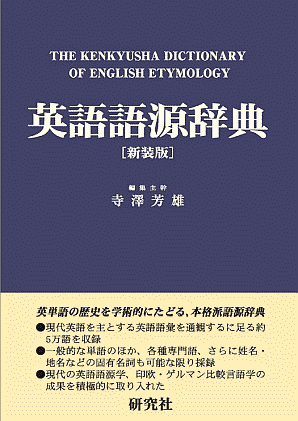
たまに振り返ってみるシリーズです.これまでの『英語語源辞典』推し活履歴は,以下の記事をご参照ください.
・ 「#5210. 世界最強の英語語源辞典 --- 寺澤芳雄(編集主幹)『英語語源辞典』(研究社,1997年)」 ([2023-08-02-1])
・ 「#5261. 研究社会議室での3回にわたる『英語語源辞典』をめぐるインタビューが完結」 ([2023-09-22-1])
・ 「#5436. 私の『英語語源辞典』推し活履歴 --- 2024年3月15日版」 ([2024-03-15-1])
・ 「#5522. 私の『英語語源辞典』推し活履歴 --- 2024年6月9日版」 ([2024-06-09-1])
・ 「#5553. 寺澤芳雄(編集主幹)『英語語源辞典』(研究社,1997年)の新装版 --- 「いのほた言語学チャンネル」でも紹介しました」 ([2024-07-10-1])
今回は2024年7月11日以降の推し活履歴を時系列に一覧します.2024年度の朝カル講座「語源辞典でたどる英語史」の関連が多いので,これについては特にこちらの記事群ご覧ください.ほかには kdee タグのついた記事群も参照.
・ 2024年07月26日 heldio で「#1153. 『英語語源辞典』を読むシリーズ (8) --- khelf 藤原くんと king の項を精読する」が公開される.
・ 2024年07月27日 朝カルのシリーズ講座「語源辞典でたどる英語史」の第4回「現代の英語に残る古英語の痕跡」が開講される.
・ 2024年08月24日 heldio で「#1182. 【緊急のご報告】研究社『英語語源辞典』新装版が重版決定!」が公開される.
・ 2024年08月24日 朝カルのシリーズ講座「語源辞典でたどる英語史」の第5回「英語,ラテン語と出会う」が開講される.
・ 2024年09月28日 朝カルのシリーズ講座「語源辞典でたどる英語史」の第6回「英語,ヴァイキングの言語と交わる」が開講される.
・ 2024年09月08日 khelf 主催の「英語史ライヴ2024」の英語史クイズにて,研究社のご提供により『英語語源辞典』が景品とされる.
・ 2024年09月08日 khelf の『英語史新聞』第10号と号外にて,『英語語源辞典』制作にかかわる貴重なエピソードが紹介される.
・ 2024年09月20日 『はじめての英語史』と『英語語源辞典』が読売新聞朝刊のサンヤツ広告に掲載される.
・ 2024年09月23日 heldio で「#1212. 『英語語源辞典』の「語源学解説」精読 --- 「英語史ライヴ2024」より」が公開される.
・ 2024年10月21日 heldio で「#1240. 『英語語源辞典』の「語源学解説」精読 (2) --- KDEE の編集方針を理解しよう」が公開される.
・ 2024年10月26日 heldio で「#1236. mine を『英語語源辞典』で読み解く」が公開される.
・ 2024年10月26日 朝カルのシリーズ講座「語源辞典でたどる英語史」の第7回「英語,フランス語に侵される」が開講される.
・ 2024年11月14日 heldio で「#1264. 『英語語源辞典』通読はキツい,無理!」が公開される.
・ 2024年11月16日 heldio で「#1266. chair と sit --- 『英語語源辞典』精読会 with lacolaco さんたち」が公開される.
・ 2024年11月30日 朝カルのシリーズ講座「語源辞典でたどる英語史」の第8回「英語,オランダ語と交流する」が開講される.
・ 2024年12月21日 朝カルのシリーズ講座「語源辞典でたどる英語史」の第9回「英語,ラテン・ギリシア語に憧れる」が開講される.
・ 2024年12月26日 heldio で「#1306. 『英語語源辞典』の「語源学解説」精読 (3) --- 印欧語比較言語学の学史をたどる」が公開される.
・ 2025年01月25日 朝カルのシリーズ講座「語源辞典でたどる英語史」の第10回「英語,世界の諸言語と接触する」が開講される.
・ 2025年02月08日 朝カルのシリーズ講座「語源辞典でたどる英語史」の第11回「英語史からみる現代の新語」が開講される.
・ 2025年03月15日 朝カルのシリーズ講座「語源辞典でたどる英語史」の第12回「勘違いから生まれた英単語」が開講される.
・ 2025年04月25日 heldio で「#1426. 『英語語源辞典』をランダム読み --- khelf メンバーとの思いつき企画」が公開される.
・ 2025年04月27日 heldio/helwa リスナーの ari さんが『英語語源辞典』で一人遊びするアプリを開発し,note 上で公表する:「#264 【KQ1】Voicy の KDEE の単語遊びを ChatGPT で体験してみた!」.アプリの改訂版は2日後のこちら:「#266【KQ2】ゴラクエを update して遊ぶ!!」.
・ 2025年05月01日 khelf の寺澤志帆さんが,連載「『英語語源辞典』でたどる英語綴字史」を開始する.
・ 2025年05月04日 heldio/helwa リスナーの lacolaco さんによる note 上の「英語語源辞典通読ノート」が順調に継続しており,crash まで達している.
khelf メンバーやヘルメイトさんとも力を合わせ,ものすごい活動になってきました.皆さんも,どのような形であれ,ぜひ KDEE 推し活にご参加いただければ!
・ 寺澤 芳雄(編集主幹) 『英語語源辞典』 研究社,1997年.
Powered by WinChalow1.0rc4 based on chalow